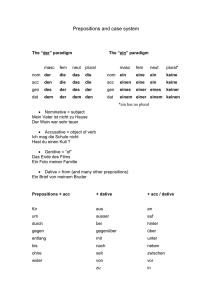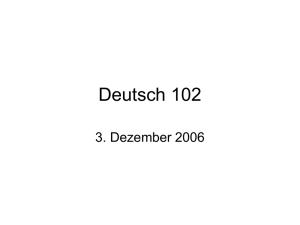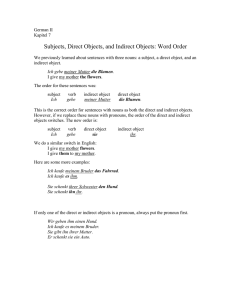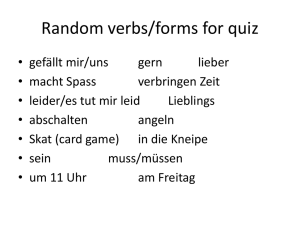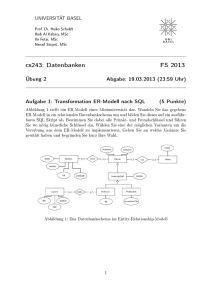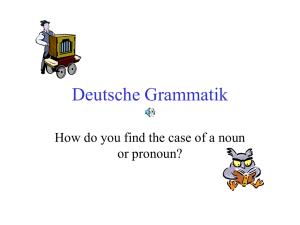Kap7
Werbung
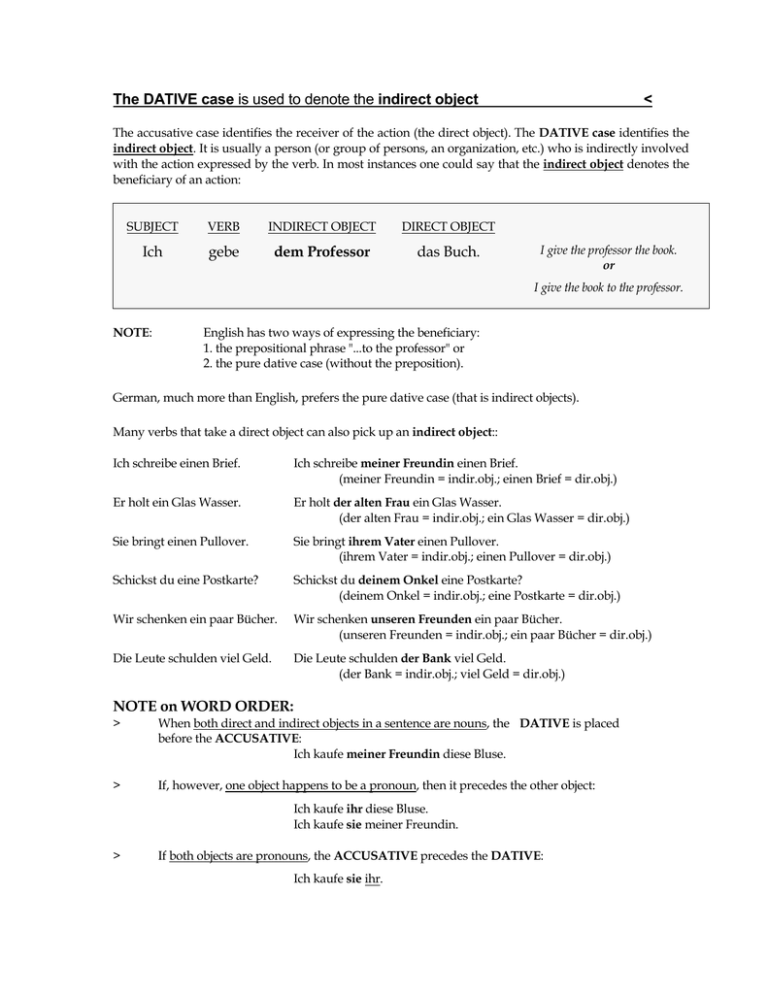
The DATIVE case is used to denote the indirect object < The accusative case identifies the receiver of the action (the direct object). The DATIVE case identifies the indirect object. It is usually a person (or group of persons, an organization, etc.) who is indirectly involved with the action expressed by the verb. In most instances one could say that the indirect object denotes the beneficiary of an action: SUBJECT VERB INDIRECT OBJECT DIRECT OBJECT Ich gebe dem Professor das Buch. I give the professor the book. or I give the book to the professor. NOTE: English has two ways of expressing the beneficiary: 1. the prepositional phrase "...to the professor" or 2. the pure dative case (without the preposition). German, much more than English, prefers the pure dative case (that is indirect objects). Many verbs that take a direct object can also pick up an indirect object:: Ich schreibe einen Brief. Ich schreibe meiner Freundin einen Brief. (meiner Freundin = indir.obj.; einen Brief = dir.obj.) Er holt ein Glas Wasser. Er holt der alten Frau ein Glas Wasser. (der alten Frau = indir.obj.; ein Glas Wasser = dir.obj.) Sie bringt einen Pullover. Sie bringt ihrem Vater einen Pullover. (ihrem Vater = indir.obj.; einen Pullover = dir.obj.) Schickst du eine Postkarte? Schickst du deinem Onkel eine Postkarte? (deinem Onkel = indir.obj.; eine Postkarte = dir.obj.) Wir schenken ein paar Bücher. Wir schenken unseren Freunden ein paar Bücher. (unseren Freunden = indir.obj.; ein paar Bücher = dir.obj.) Die Leute schulden viel Geld. Die Leute schulden der Bank viel Geld. (der Bank = indir.obj.; viel Geld = dir.obj.) NOTE on WORD ORDER: > When both direct and indirect objects in a sentence are nouns, the DATIVE is placed before the ACCUSATIVE: Ich kaufe meiner Freundin diese Bluse. > If, however, one object happens to be a pronoun, then it precedes the other object: Ich kaufe ihr diese Bluse. Ich kaufe sie meiner Freundin. > If both objects are pronouns, the ACCUSATIVE precedes the DATIVE: Ich kaufe sie ihr. Dative Case Prepositions < After the following nine prepositions one must use the DATIVE CASE. aus (out of) (from) Er kommt gleich aus dem Kino. Jan kommt aus Berlin. außer (besides) Sie hat außer dem Audi noch einen VW. bei (near) (at) Das Kaufhaus ist bei der Post. Wir sind heute bei unseren Freunden. gegenüber (opposite of) Meine Wohnung ist gegenüber dem Kino. mit (with) Helga spielt mit ihren Freunden. nach (to) (after) Fährt Manfred morgen nach Köln? Nach der Schule spielen die Kinder hier. seit (since) (for) Karl studiert seit 1994 in Hamburg. Ich wohne seit zwei Monaten in Bonn. von (from) Sie kommt von dem [vom] Postamt. Contractions of DATIVE prepositions < The prepositions "bei", "von" and "zu" often contract with the definite article dem, and "zu" also contracts with the definite article der. bei dem beim Frau Schneider wohnt beim Kino. (Mrs. Schneider lives near the movie theatre.) von dem vom Sie kommt vom Postamt. (She comes from the post office.) zu dem zum Geht ihr zum Einkaufszentrum? (Are you going to the shopping centre?) zu der zur Ich fahre jetzt zur Universität. (I'm going to the university now.) A. Fill in the blanks with the indirect objects given in parenthesis (in NOMINATIVE). 1. Ich erzähle ________ von dem Buch. (eine Freundin / du / ihr / mein Bruder /sie;sg) 2. Gibst du _______ ein Geschenk? (die Lehrer / sein Freund / wir / sie pl. / ich) 3. Das tut ________ leid. (Herr Rust / der Mechaniker / die Schweizer / es) 4. Was schenken Sie __________ ? (Ihr Bruder / Ihre Kusine / er / wir / sie;sg.) 5. Ich schulde _________ 20 Mark. (mein Bruder / er / du / die Leute / ihr / sie ) 6. Helft ________ ! (der Student / ich / die Touristin / wir) 7. Sarah spricht mit _________ . (der Deutsche / das Postamt / ihr / der Arzt) 8. Antworte _______ ! (ein Mann / der Professor / ich / wir / er) 9. Sagen Sie das _________ . B. (die Männer / die Sekretärin / meine Eltern / die Frau) Fill in the blanks with an appropriate direct and an indirect object in the correct order. (Use nouns and pronouns in parenthesis which are in the nominative case.) 1. Wir schicken ______ _______ . Schickt ihr ______ _______ . Die Bank schickt ______ _______ . Ich schicke ______ _______ . (unser Lehrer / die Zeitung) (das Paket / ich) (die Schecks / wir) (ein Brief / Bank) 2. Schenkst du ______ _______ . Ich schenke ______ _______ . Die Leute schenken ______ _______ . Sie schenkt ______ _______ . (die Meyers / eine Flasche Wein) (ein gutes Buch / meine Mutter) (die Universität / viel Geld) (er / keine Minute) 3. Helmut zeigt ______ _______ . Peter zeigt ______ _______ . Meine Mutter zeigt ______ ______ . Du zeigst ______ ______ . (seine Freunde / die teure Kamera) (sie (pl.) / sein neuer Porsche) (alte Fotos / ihre Schwester) (der neue australische Film / ich) 4. Bringst du ______ ______ ? Der Mann bringt ______ ______ . Deine Schwester bringt ______ ______ . Die Frau bringt ______ ______ . (der Pullover / dein Vater) (die Zeitungen / die Kanadier) (er / ein Stuhl) (ein Glas Wasser / ich) C. Cope with the following situations with complete sentences in German. (Use dative prepositions and dative verbs whenever possible) Ask a friend what s/he is doing after the movie. Say you will get your parents' car (car of your parents) tomorrow. Your apartment is messy and you want to clean up. Ask your apartment mates which one is going to help you. Your friend is going away on vacation. Tell him to write you a postcard. Ask Ben who is coming to his party (fem.) besides his (female) cousin. Say that you are going to get a CD player from your brother for the party. You're in class and someone tells you there's going to be a test. Reply that you don't believe her/him. Your friend says that something funny happened in German class. Tell him/her to tell you the story.

